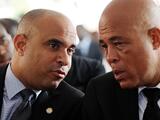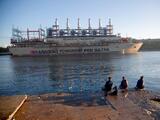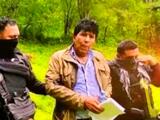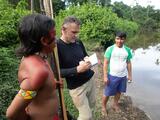New York drug trial provides deeper insights into Honduran corruption, implicates president
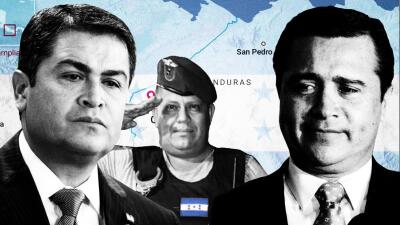
In 2013, seated across a roundtable from then-presidential candidate Juan Orlando Hernández, alleged drug trafficker Geovanny Fuentes opened up a black briefcase and pulled out $15,000 dollars in cash. “To help you with the campaign,” said Fuentes.
The apparent bribe was allegedly intended to ensure Fuentes and his drug shipments were protected from, and by, law enforcement. In Honduras, it worked. But in the end, it made him a target of the US Drug Enforcement Administration (DEA) as part of its ongoing investigation of Hernández and led to his arrest upon arrival to Florida in March 2020.
A year later, Fuentes is set to go on trial beginning March 8 in a case that could ultimately help determine the fate of Hernández – an unindicted co-conspirator who prosecutors have accused of accepting millions in bribes from drug traffickers – and the course of U.S.-Honduras relations under the Biden Administration.
Hernández has repeatedly denied all links to drug traffickers, affirming recently that they had found a “magic key” to reduce their sentences by making what he says are false accusations against him.
The trial is likely to also provide greater insight into the spider’s web of political corruption in Honduras, including the involvement of the Honduran military and police in drug trafficking, as well as the Mexican cartels operating in Central America.
The trial comes just a couple weeks after Democratic senators presented a bill that would sanction Hernández for his alleged drug trafficking and corruption, setting off a firestorm in Honduras forcing the president to give an emergency address to Congress to defend himself.
The trial could also impact presidential elections in Honduras in November, with primaries due to take place later this month.
The Early Years
Fuentes rose from a low-level distributor of cocaine to a large-scale drug trafficker with his own cocaine laboratory and control of crucial territory along the north coast of Honduras, according to court filings, dozens of interviews with confidential sources and classified documents obtained exclusively by Univision.
Around 2003 Fuentes met alleged assassin and drug trafficker Melvin Sandres, alias ‘Metro,’ a Honduran soccer club owner with whom he would become partners. Fuentes started operating in Miami, receiving two to three kilos of cocaine per month from Sandres. The drugs were hidden inside the tires of planes that departed from the northern city of San Pedro Sula.
By 2010, Sandres and Fuentes had established a cocaine laboratory near Puerto Cortes, on Honduras’ north coast and home to the largest port in Central America. That year, Sandres introduced Fuentes to one of the leaders of a notorious local drug clan the Cachiros, Devis Leonel Rivera Maradiaga, who Sandres had worked with for many years by then.
Sandres won’t be testifying in the trial as he was murdered in his home in 2013, after an assassin he hired to kill the Cachiros, betrayed him.
The meeting between Sandres, Fuentes and Rivera took place at a gas station owned by the Cachiros along the coast and near the cocaine laboratory. The three huddled inside Fuentes’ car, where he had a pair of rifles which he said he’d obtained from bodyguards of former Honduran President Pepe Lobo.
The main reason for the meeting was to discuss the cocaine laboratory, which by then was producing around 200 to 300 kilograms of cocaine per month. Sandres and Fuentes wanted the Cachiros to invest. Fuentes bragged that he had several high-level police officials in his pocket who were providing him with information to help protect their drug shipments and laboratory. Rivera agreed and provided the pair with $65,000 in cash. Perhaps more important than the money, Rivera’s investment meant the laboratory would be well protected, given the powerful connections of the Cachiros.
After the meeting, Fuentes started helping Sandres to arrange and provide security for drug shipments owned by the Cachiros and another drug clan, the Valle.
The Colombia Connection
Through their work with the Cachiros, Sandres and Fuentes allegedly made contact with a Colombian drug trafficker named Mariano Cardenas Linares, alias ‘Yuca,’ who they later started receiving shipments from on their own, which arrived by plane and boat to the northern Honduras department where the two operated.
Cardenas is the nephew of José Linares, alias ‘Don Eva,’ who until his capture in 2012, was the leader of a drug clan in Colombia that trafficked cocaine with the FARC. After his uncle was captured, Cardenas apparently picked up where he left off, conspiring with the FARC to ship cocaine via air and maritime routes from Apure, Venezuela to primarily Honduras and Guatemala.
Cardenas was captured in October 2015. After attempting to gain amnesty by claiming he was a member of the FARC, he was extradited to the U.S. where he pled guilty to drug trafficking. Cardenas appears to have entered into a cooperation agreement with prosecutors and could be called to testify against Fuentes.
The Cocaine Lab
Despite their best efforts, in March 2011, police raided the cocaine laboratory, which was located in the village of Cerro Negro a short drive from the port of Puerto Cortés.
During a post-arrest interview with DEA agents, Fuentes admitted that the property was his and said that he “provided maintenance” on a coffee plantation there. The police, however, said that the coffee plantation was just an attempt to cover-up the laboratory. With the investigation ongoing, Fuentes allegedly paid off a judge to make the case go away.
A police officer who was involved in the raid on the laboratory was later killed by Fuentes and Sandres, according to court documents. The policeman was apparently overheard talking about his involvement at a nightclub that unbeknownst to him was owned by Sandres.
Emboldened by the impunity and having made their own connections with Colombian cocaine suppliers, Sandres and Fuentes built another laboratory nearby and made plans to eliminate their competition, the government alleges.
Upset over an outstanding debt owed by a drug trafficker that went by the alias of ‘Pluto,’ Sandres and Fuentes hired assassins to have him killed, according to witnesses in the case. They then turned their sights on the Cachiros, attempting to hire an assassin called ‘Vaquero’ to kill them. But Vaquero tipped off the Cachiros of the plan, who in turn hired him to kill Sandres. In October of 2013, Sandres was murdered in the middle of the night inside his home.
Business Connections
Sandres and Fuentes were deeply intertwined with the business community in Choloma. Sandres co-owned the football club Atletico Choloma. Sandres and Fuentes were known to throw big parties at the stadium and were often seen at games with their associates, including the police officer Leonel Sauceda, who was for a time the chief of police in neighboring San Pedro Sula and who is listed as a co-conspirator in the case.
Sandres also co-owned an import business along with a former police officer and cousin of the Cachiros. For his part, Fuentes co-owned at least seven businesses and had undeclared interests in a number of others. The businesses included a shipping company, agriculture and import/export operations. They were the perfect cover for drug trafficking, particularly for someone who according to multiple sources, shipped cocaine in containers out through the port of Puerto Cortés.
Among the businesses in which Fuentes had a hidden interest was an agricultural company owned by Fuad Jarufe. Multiple sources say that Fuentes acted as a representative of the business, although he was not on paper a legal partner.
Enter the Future President
Jarufe built an agricultural empire that made him one of the region’s power brokers and invited frequent visits from prominent politicians from all parties, including Yani Rosenthal, former president Manuel Zelaya and current president Juan Orlando Hernández, who used to land his helicopter in a vacant lot adjacent to the factory that is now occupied by a hardware store.
Rosenthal pled guilty to money laundering in the United States in 2017 and sentenced to three years in prison. He was released last year and is now tipped as a leading presidential candidate ahead of primary elections this month.
During his 2013 campaign for the presidency, Hernández visited frequently, meeting with Jarufe and often leaving with a contribution. Inside Jarufe’s office, the pair would discuss politics and the ongoing campaign. In one meeting, they allegedly talked about some of the corruption schemes that were being employed at the time to embezzle public funds and finance the campaign, including funneling money through nonprofit fronts and stealing from the national health system. “We’re stealing better than in the times of Callejas,” said Hernández, referring to former President Rafael Callejas, considered one of the most-corrupt presidents in recent history.
Hernández is also alleged to have made it clear that he had little intention of handing over the presidency after one-term, despite a constitutional prohibition against reelection. “The business is too good to leave it after four years,” he said.
In 2013, Hernández met with Fuentes in Jarufe’s office, where the two discussed the cocaine laboratory and how to evade U.S. and local law enforcement, according to witnesses in the case.
Fuentes allegedly thanked Hernández for help avoiding any consequences for the discovery of the laboratory. “So, you see what it’s like to be in with the right people,” said Hernández. “Nobody can touch you. Don’t worry about your belongings, nobody will take them away. Nothing has happened here," according to the evidence in court documents.
Fuentes then asked about the DEA and the potential for extradition. “I have them eating out of my hand,” said Hernández about the Americans. “We’re going to shove the drugs right up the noses of the gringos and they won’t even realize it.”
Hernández is also alleged to have revealed his intention to eliminate a recently approved extradition law. “Oliva and Chinchilla are already working on that,” he said, referring to the legislator Mauricio Oliva, who soon after became president of Congress, and attorney general Oscar Chinchilla. “I put Chinchilla there to protect us,” he added.
Extradition was never eliminated, at least not yet. But sources say there was at least one serious attempt in 2014 that was thwarted by heavy pressure from the U.S.
Hernández then told Fuentes that he was interested in his laboratory due to its strategic location near the port, promised that the military would support his drug trafficking activities and instructed him to get in contact with his brother Tony Hernandez, who he said was running drug trafficking operations in the country. “I’m going to give you Tony’s number so that you can put yourself under his orders,” said Hernández.
Fuentes allegedly delivered $15,000 to Hernández in that meeting and then an additional $10,000 in a subsequent one.
Hernández has called the accusations lies from confessed drug traffickers and murderers who are seeking reductions in their sentences. Tony Hernandez was convicted of drug trafficking in New York in 2019 and his sentencing – delayed a year by the pandemic – is scheduled for March 23.
The accusations surround his meetings with Fuentes, however, come from a protected witness who apparently worked for Jarufe, overheard the discussions and was asked to exchange the dollars given by Fuentes to Hernández into the local currency.
In his post-arrest interview, Fuentes acknowledged that he knew Jarufe very well and that he was a campaign contributor to Hernández, who has not denied visiting the office.
After the meetings, Fuentes allegedly received support from the military, including a gift of a green sub-machine gun that he told others was given to him by Rene Ponce Fonseca, who was then the commander of the 105th Military Brigade and later became the head of the joint chiefs of staff of the Honduran armed forces.

The Trial
Fuentes made a number of admissions during his post-arrest interview that appear to corroborate some of the allegations, including knowing a number of drug traffickers and even the assassin who in the end killed his partner Sandres. When he was arrested, he was likely on his way to visit his sons who live in Florida and at least one of which has since been named a co-conspirator in the case.
There is little doubt that prosecutors hoped that Fuentes would decide to cooperate instead of going to trial. Few Honduran drug traffickers have decided to risk their fate in court, and those who did were all convicted and received lengthy sentences.
Whatever the trial's outcome, it will reverberate from New York to Washington D.C. and down to Honduras.
